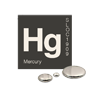 |
Alchemy
1.0
A framework to robustly process network messages and structured data
|
 |
Alchemy
1.0
A framework to robustly process network messages and structured data
|
Optimizations continue to improve the speed of Alchemy each week. This is a summary of the current benchmark results. The details are further below:
| Test | % Faster |
|---|---|
| Basic: | 19.1005% |
| Packed: | 11.5171% |
| Unaligned: | 1.85696% |
| Complex: | 3.78353% |
| Array: | 72.2728% |
| Total: | 19.9351% |
Arrays appear to out-perform the basic hand-written equivalent by a considerable margin.
A portable framework to robustly process network messages and structured data. This library can also be used for serialization tasks and provides compile-time reflection for Hg-defined structures.
Alchemy is portable across different processor types and platforms. There is currently only one tool in the Alchemy framework, Hg (Mercury).
Currently Alchemy is based on template library development with the same methodologies that are used to develop the Standard C++ Library. Therefore the project only includes header files.
Alchemy requires a C++98 compiler with the TR1 extensions. Where possible C++11 and C++14 constructs will be utilized. However, the goal is to allow the library to continue to function in the absence of these newer compilers and features, with the potential loss of convenience or performance.
All commenting is done using doxygen.
Hg is a message and structured data processing framework that provides the ability to define portable structured message formats. Hg creates ABI consistent definitions that are compatible to the bit-level. These structured definitions will facilitate the population of the data in the memory buffers for inter-process communication, file and network transfer, and even direct memory access mapping.
Message structure definitions are created with the list of MACROs below. Refer to the appropriate MACROs documentation for details on correct usage:
HG_BEGIN_FORMAT(TYPE_LIST, ...)
Hg provides a portable bit-field interface that works by generating the appropriate shift and mask operations for each field. This provides the convenience of using C/C++ bit-field language feature, but can still create a predictable bit-sequence in a packed byte buffer.
Use these MACROS to define a set of bit-fields that are packed into a user-specified integral type.
Hg currently is written to allow up to 32 bit-fields in a single parameter.
Here is a short example of a Hg message definition and how it can be used:
// Message definition specifies the TypeList format, and associates a name with each field. HG_BEGIN_FORMAT(AppError, HG_DATUM(uint32_t,id) HG_DATUM(uint32_t,code), HG_ARRAY(char,128,desc) )
// Now messages can be created, populated, copied, and converted between byte-order. AppError::host_t msg; msg.id = 1; msg.code = GetError(); strncpy(msg.desc, GetErrorDesc(), sizeof(msg.desc));
// Convert to network byte-order AppError::net_t msgNet = Hg::to_network(msg);
// The fields id and code will have been converted if this is // a little endian system, otherwise no change will have occured. // Assuming there is a socket open and ready to be written to, // the network instance of the message will provide the data. send(sock, msgNet.data(), msgNet.size(), 0);
Hg provides the convenient interface for users to convert data values into a data buffer.
Hg is a C++ template library, it does not produce any module on its own.
Alchemy does not provide any transport mechanism. This currently is not a priority for this library because there are plenty of libraries that already exist to manage data transfer between two nodes. I intend to create adapters that are compatible with common serialization and transport interfaces like Boost::Serialize and Boost::Asio.
I envision users of the library to be able to use message objects defined for host-byte order, and the transport adapters will decide if the message byte-order needs to be adjusted. For example, if the transport adapter is a socket, the adapter will convert to network-byte order. However, if the transport is a named-pipe on the same system, it will not perform any byte-order adjustments.
If you know of other transport libraries and would like to see an Hg adapter to that library, please create a new issue request.
Benchmark performance:
Machine: *Intel Core i7-4790L @ 4.00GHz *16 GB RAM *Windows 8.1
Loading test data: Hit enter when ready...:
| Test | Msg Size | Cycles |
|---|---|---|
| no_conversion | 64 | 8388608 |
| basic | 14 | 38347922 |
| packed | 7 | 76695844 |
| unaligned | 19 | 28256363 |
| complex | 86 | 6242685 |
| array | 1024 | 524288 |
Running control benchmark: Test completed
Running Hg benchmark: Test completed
diff: Is time difference calculated as control - Hg percent: Value indicates Hg performance (+ is better)
| Test | control | Hg | diff | percent |
|---|---|---|---|---|
| Basic: | 0.612162 s | 0.495236 s | -0.116926 | 19.1005% |
| Packed: | 0.691659 s | 0.612 s | -0.0796588 | 11.5171% |
| Unaligned: | 0.571058 s | 0.560454 s | -0.0106043 | 1.85696% |
| Complex: | 0.806906 s | 0.776377 s | -0.0305296 | 3.78353% |
| Array: | 0.567276 s | 0.15729 s | -0.409986 | 72.2728% |
| Total: | 3.24906 s | 2.60136 s | -0.647704 | 19.9351% |
These scenarios are trivial to write by hand, and are currently outside of Alchemy's capabilities. Therefore, Alchemy woefully underperforms in these scenarios.
| Scenario | control | Hg | diff | percent |
|---|---|---|---|---|
| NoConversion: | 0.361389 s | 0.577049 s | 0.215659 | **-59.6751%** |
These are the basic benchmark tests that have been written:
Previous Results
**Additional tests will be added as the existing implementation is refined.
Active and Planned Improvements:
Currently in progress:
Soon to follow:
 1.8.3.1
1.8.3.1